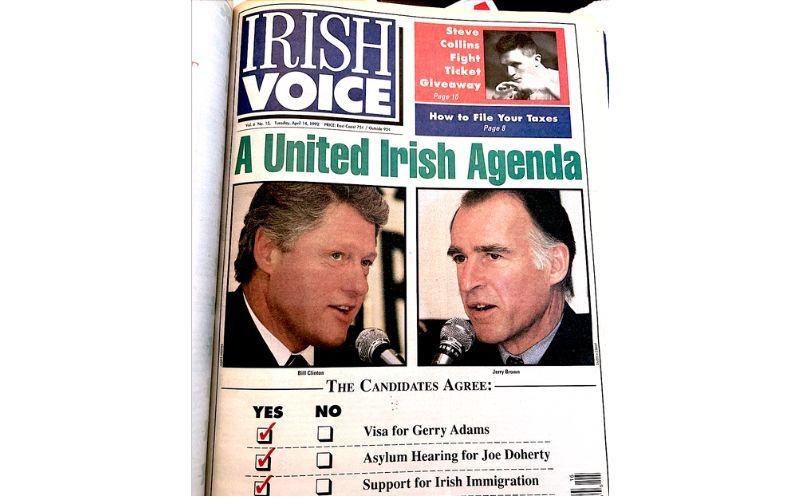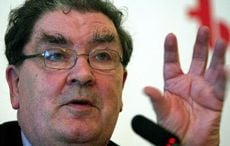Like in New York and other cities around the world, the appalling carnage in Paris prompted an outpouring of sympathy in Dublin with vigils and demonstrations as people here stood in solidarity with the people of France. There were messages of sympathy from President Michael D. Higgins and Taoiseach Enda Kenny and church leaders. On social media people from all walks of life in Ireland expressed their horror and revulsion at what happened.
Some of these social media messages came from prominent figures in Sinn Fein, including one in the hours immediately after the Paris shootings from Gerry Adams in which he tweeted, "Deplorable attacks in Paris are to be condemned." He also retweeted a message from Mary Lou McDonald in which she said, "Thoughts and solidarity with the people of Paris and France tonight." Martin McGuinness tweeted, "Shocking news from Paris. Thoughts and prayers with the families of those killed and injured."
It would be both unfair and inaccurate to suggest that these messages were in any way insincere. McDonald was still in her private school uniform in Dublin when The Troubles were at their worst so we will leave her out of this.
But Adams and McGuinness know better than most people the human cost of violence of the kind seen in Paris. They eventually moved away from it, playing a major role in ending the similar violence perpetrated in Ireland and Britain by the IRA over the years of The Troubles.
Even so, it is impossible to read such messages from Sinn Fein leaders without thinking of the similarities between the violence in Paris and the violence inflicted by the IRA on so many innocent civilians in Britain in the recent past.
The revulsion and outrage around the world over the Paris attacks comes largely from the fact that innocent people at a football game and a rock concert and people out for the evening in bars and restaurants were mercilessly targeted with the aim of spreading terror across the city.
This was indiscriminate violence, merciless and cruel. Its aim -- in so far as Islamic State has aims that are coherent -- was to terrify the French people so much that their government would end their involvement in Syria and bow to the IS agenda.
The parallel with what the IRA did in Britain from the early 1970s onwards is striking. The objective was the same: Terrify the British population by extreme acts of random violence so that the government would be forced to give in to the IRA agenda (even if that agenda had little support).
The methods used were similar as well. In Paris, innocent people on a night out in pubs and restaurants were attacked.
Remember the Birmingham pub bombings carried out by the IRA in November 1974 in which 21 people died and more than 180 were injured, many of them in life changing ways? You tell me what the difference is -- and there were other IRA attacks on bars and restaurants as well.
Or the year before, when the IRA set off bombs at two of the busiest train stations in London, injuring more than 20 people. Or in the week before Christmas in 1983 when the IRA bombed Harrods in London, the world famous department store, injuring 90 people and killing three policemen.
Or 10 years later in 1993 when the IRA placed bombs in litter bins in a busy shopping street in the town of Warrington, near Liverpool, and two little boys died as a result. Or the massive IRA bomb at the Arndale shopping center in Manchester in 1996 which injured over 200 people. This followed a bomb in central Manchester four years earlier which injured more than 60 people.
Of course one could go on and on with this, listing IRA attacks in Britain over more than 20 years. There were dozens of them, and they varied from smaller attacks to huge explosions like those in the financial district in London in The City and at Canary Wharf, causing over a billion pounds in damage and killing and injuring innocent people.
Let's be clear. This was terrorism by the IRA just as the Paris attack was terrorism by IS.
The deliberate targeting by the IRA of places like shopping centers, office complexes, train stations and hotels, where there were huge numbers of ordinary people -- instead of military targets -- made civilian casualties inevitable.
The claim at the time that the IRA was trying to avoid killing civilians because it usually gave 30 minute warnings of bombs by phone to the police makes some difference, but not enough to avoid the classification of what they were doing as terrorism.
Read more: Paris attack victim was a descendant of Irish hero Robert Emmet
On numerous occasions the warnings were either non-existent or inadequate or hopelessly confusing; frequently bombs went off as police tried to clear particular buildings or complete areas, and the dozens of ordinary people who died and the hundreds who were injured over the years are evidence of that. In more than one case the IRA claimed they could not find a working public telephone in time, which would be funny were it not so horrific.
This was terrorism. The effect in Britain in those years was the same as the hoped-for effect in Paris, with many people at various times afraid to go shopping, to go into the center of cities, to use public transport. At its worst, a veil of terror hung over areas in London.
There are other similarities as well. Just as there are now fears that the Paris attack will lead to a backlash against Muslims in general who live in Europe and against recent migrants from North Africa, the IRA campaign in Britain at times in the 1970s and ‘80s made life very difficult for the hundreds of thousands of Irish people who had made English cities their home. An Irish accent was enough to cause suspicion and resentment among ordinary British people.
And just as the vast majority of Muslims hate and despise what IS is up to, so too the vast majority of Irish people both here and in Britain disowned what the IRA was doing at the time.
But that did not stop the IRA. Nor did it stop the excuses and justification from Adams and other Sinn Fein leaders.
The historian Ruth Dudley Edwards last weekend remembered that when the members of the IRA unit who had terrorized London in the mid-1970s (the group caught in the Balcombe Street siege) were finally freed in 1998, they got a heroes' welcome that year when they were introduced at the Sinn Fein annual convention in Dublin where Gerry Adams referred to them as "our Nelson Mandelas."
These guys had been responsible for killing dozens and injuring hundreds of ordinary people in Britain in what were clearly acts of terror (like throwing bombs into restaurants). But instead of being condemned by Sinn Fein leaders, they were cheered for minutes on end by the Sinn Fein crowd at the convention.
The similarity even extends to suicide bombers. Unlike the Paris attackers who blew themselves up, however, the IRA had its own version of suicide bombers -- unwilling victims who were forced to be "proxy" bombers.
The best known example of this was the unfortunate Patrick Gillespie from Derry, a Catholic who worked as a cook in a British Army base. In 1990, while his family were held hostage, he was forced to drive a van packed with explosives to a British Army checkpoint where the bomb, primed remotely by the IRA in a following car, detonated. He was blown to bits and six soldiers were killed.
Even today, it is impossible to get a clear condemnation of acts of terror like this -- and all the other IRA acts of terror -- from Sinn Fein leaders. Instead they use carefully constructed sentences in which they say that in a "war" there are unintended consequences and innocent people on all sides suffer and mistakes and "wrong" things happen. Yet they had no problem coming out in the hours after the Paris terror attack with outright condemnation.
Here's a suggestion: The tweet from Adams -- "Deplorable attacks in Paris are to be condemned" -- and the other tweets from Sinn Fein leaders on the night of the Paris attack could have won much wider acceptance if they had said something like this, "Like the many IRA bombings in British cities which were deplorable and killed and maimed many innocent people and which we now condemn, the deplorable attacks in Paris are to be condemned."
It would have taken several tweets to get the message across. But it would have been worth doing.
Read more: At last, the rise and rise of modern Sinn Féin fully explained




Comments